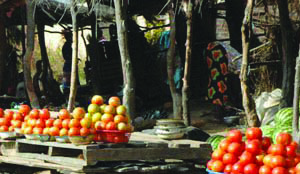 IT is unfortunate that what some consider a means to an end through trade, is also quickly viewed by others as an opportunity to attack and rob innocent citizens.
IT is unfortunate that what some consider a means to an end through trade, is also quickly viewed by others as an opportunity to attack and rob innocent citizens.
Views by some Lusaka residents that makeshift structures around the fly-over bridge in Lusaka are now hiding places for criminals are a source of worry, and should be addressed quickly.
The decision to allow street vending or trading in certain designated open places was made in good faith to enable people make a living for themselves.
That said, this is not a ‘passport’ for anarchy, hence those involved should ensure that they do so in a manner that does not infringe on the public health and safety regulations.
It is important to remember that those that trade in the vicinity of the town centre have a responsibility to do so under conditions that will not endanger the public.
The makeshift stores should not, therefore, create a security threat for those that move along the fly-over bridge for example, simply because the owners cannot secure them after concluding their business for the day.
Given the rising crime levels, it is imperative that the council compels traders to come up with makeshift stores that they can take down at the close of business to prevent thugs from turning them into hideouts from where they launch attacks on innocent passersby.
If regular security patrols cannot be provided to thwart any such attacks, then plans should be put in place to clear the area of these structures for people to easily and safely make their way through without hindrance.
It is also probably wise for the local authority to reconsider the suitability of some of the areas for vending.
The fly-over bridge area specifically brings into question the suitability of the area for makeshift trading structures because apart from being a security risk, the structures are next to an active train track, thereby posing a serious danger to the traders themselves.
Apart from safety aspect, the makeshift structures do little to add to the beauty of the capital city, and similar sentiments can be made about these structures in other towns. They are simply an eyesore.
While the Government has embarked on beautifying and expanding the city through the ring roads project, such efforts must not be diluted by indiscriminate erection of ugly and unplanned structures.
The structures have also made it difficult for councils to effectively clean areas dominated by vendors and as a result, heaps of uncollected garbage is a common site.
This unfortunate scenario should not get to a point where people begin to shun certain areas because of the crime or filth, before councils and security wings can move in to address the situation.
Therefore, we urge the council to quickly find a lasting solution to this predicament.
Those given the responsibility of planning should also not wait until unplanned and makeshift structures choke the cities and towns but should be able to enforce strict planning regimes that retain sanity but accommodates everyone including vendors.
The promise by the Lusaka City Council to address the latest concerns therefore, should not simply end in words but decisive action over the concerns raised.






